- Home
- Penelope Lively
Heat Wave Page 2
Heat Wave Read online
Page 2
Maurice is standing now at the window, holding a cup of coffee. He turns, lowering his cup. ‘We might go somewhere on Sunday, if this weather holds. James and Carol are coming for the weekend. James wants to go over Chapter Six again.’
‘I’ll do a big shop in Hadbury this morning,’ says Teresa. ‘Maybe we’ll have a leg of lamb.’
Pauline stows her letter in her pocket. ‘Carol?’ she says.
Maurice has picked up the newspaper now, is scanning the front page, abstracted.
‘She lives with James,’ Teresa tells her mother. ‘Carol … oh, what is her other name, Maurice? Anyway … will they come on Friday or Saturday?’
‘Saturday morning,’ says Maurice. He puts down the paper, finishes his coffee, moves towards the door. ‘So … back to the grindstone.’ He looks over at Pauline. He smiles – a propitiating, lop-sided, characteristic smile. ‘How’s your grindstone at the moment, Pauline? Anything interesting?’
‘Not specially,’ says Pauline. There is the faintest edge to her voice, a tiny hardness. Perhaps it is because she has opened another letter and is picking at a staple in the corner of some papers, always an irritating process.
Maurice leaves the room. He goes upstairs. Both women hear the door of his study close. Pauline succeeds in detaching that staple and glances through a torrent of justifications from an author which he, in his fervour, had stapled together out of sequence. She continues to see Maurice’s face superimposed above the text, like the Cheshire Cat, and thinks about faces – those presences in the mind. A face is an image, as insubstantial as a way of moving or the inflexion of a voice. A face cannot be translated into words – or only up to a point.
Maurice’s face is triangular. The forehead is broad and the eyes set wide apart, the nose is thin and quite pronounced. The planes of his cheeks slope sharply inwards to a pointed chin. His hair springs upwards, thick and wavy and light brown. Words … which give a notion of what Maurice looks like, which might form the basis of an Identikit portrait, but which are a feeble reflection of the particularity of features – that quality which means that those who know him well can conjure up Maurice’s face at will, which means that Luke could pick it out from a dozen others and say, ‘Da!’
Luke’s face is an assemblage of references. Pauline sees Maurice there, in the spacing of his eyes. She sees Teresa’s nose and a suggestion of her high curved eyebrows. She sees also something of herself – a quality of expression that she catches in the mirror and has caught also as Luke turns his head and stares up at her. She sees also a flicker of her mother and a shimmer of her father and once she has caught an echo of an aunt she barely knew but whose distinctive features look out from a photo in a family album. It is as though Luke is in the process of trying out this feature and then that until eventually he arrives at some acceptable synthesis.
Teresa’s face is oval, pale-skinned, dark-eyed. She has thick eyebrows and a high forehead from which her dark hair is pulled back and held by a band at the nape of her neck. When Pauline looks at her she sees all this, and sees also her serious, faintly anxious expression. But she sees something else as well, perceptible only to her, which is that eerie echo of self that a parent sees in a child. Teresa and Pauline are not alike – Pauline’s features are broader, flatter, her mouth is larger, her eyes are greenish, her hair a coppery brown streaked now with grey. Nevertheless, that echo is there, that mirror-glimpse of self – elusive, indefinable, but inescapable. There she is, thinks Pauline – Teresa. And there somehow am I too, she does not think but simply sees. And there also, inescapably, is Harry.
‘More coffee?’ says Teresa.
‘Mmn … Thanks.’
Teresa, Pauline and Luke are alone in the kitchen. Everything is subtly different, as though the wind has shifted direction. There is a change of key as the two women speak. Certain resonances are lost, others have arrived. Only Luke, busy with his own concerns, remains constant.
‘You may as well leave Luke with me while you do the shopping,’ says Pauline.
Teresa demurs. ‘You’re working.’
‘I can stop working and catch up tonight. My time is my own these days.’
‘OK then,’ says Teresa. ‘Thanks. Anything I can get you?’
‘Bread, I could do with. Some fruit. I’ll have a think.’
There is silence, invaded only by Luke’s comings and goings around the room, his commentaries, his exclamations.
‘Nescafé,’ says Pauline. ‘And plain yoghurt. Otherwise I’m fine.’
‘Right.’ Teresa is making a list. She breaks off and stares at the table. She chews her lip. Perhaps she is thinking about groceries. Perhaps not.
Pauline looks at Teresa. ‘Where are they at, on this book? Maurice and James thing?’
‘Saltash. They’re sort of at the beginning of the second draft, I think.’
‘Maurice seems to need a lot of editorial input.’
‘Maurice says James is very constructive. James has been talking to this film guy too and they’ve got to be sure Maurice gets the book right if the TV programme is really going to come off.’
‘Ah.’
‘Luke could have scrambled egg for his lunch,’ continues Teresa. ‘If I’m late back.’
‘What about Maurice? Do I provide him with scrambled egg too?’
‘Maurice won’t mind waiting,’ says Teresa.
A mundane enough exchange. Useful, though – an arrangement has been made, information has been given and received. There are echoes and reverberations, there is a shimmer on the bland surface. Ordinary words are loaded, there are echoes of other events, other exchanges, of different manifestations of Pauline, of Teresa. A cycle of inescapable involvement is manifested in each inflexion of their voices. They are talking not just of shopping lists and lunch, but of a shared history.
And Pauline, seeing Teresa chewing her lip as she stares mutely at the kitchen table, sees her dissolve for an instant into another Teresa, staring at a different kitchen table in another house – to look up suddenly and say, ‘I’m not going out with Don tonight.’
‘Huh!’ says Pauline. ‘Standing him up, are you?’
Teresa looks awkward now. ‘Not exactly. Just … well, it’s all gone a bit stale, so I said maybe it’s better if we don’t go out together tonight.’
‘It’s called standing a person up,’ Pauline advises. ‘If you’re just sitting there fancy free could you do me a favour and stir that. I have twenty people coming here in three hours’ time.’
Teresa, now, is mortified. She has gone pink in the face. She is a kind girl, that is the problem.
‘He’ll get over it,’ says Pauline. ‘It’ll be water down the drain by the end of next week.’
‘Thanks,’ says Teresa, mildly offended.
‘Because he’s young and healthy. And now here you are footloose on New Year’s Eve. What are you going to do?’
‘I’m coming to your party,’ says Teresa.
‘Oh, you are, are you? All the more reason to get stuck in here, in that case. That has to be spread on those, and we’re going to make some sort of punch.’
‘Who’s coming?’ enquires Teresa.
One echo among many – extinguished already by the onward rush of things as Teresa gathers up her purse, her car keys, her shopping bag, as Luke howls briefly in protest, as Pauline sweeps him up and out into the garden to distract him from the departure of his mother.
The garden at World’s End is a rectangle jutting out into a field. It is the amalgamation of the three long thin strips which were the gardens of the original cottages – the sparse gesture which allowed each labouring family its own small plot on which to grow a few vegetables. And flowers – cottage garden flowers whose descendants tenaciously reappear year after year. At the end of the garden is an orchard of ancient apple trees, way past their prime, which deliver a crop of scabby fruit. These also are presumably relics of the former inhabitants of the place, cherished assets back then which are united now
into a neglected place of lush grass which no one ever gets around to cutting.
The surrounding field is planted not with wheat but with young cabbages, rank upon rank of bluish-grey plants which merge into a swathe of delicate colour. This is a smaller field, bounded by a hedgerow. Beyond the hedge the hill rises, another acreage of green wheat. But this field is not the same uninterrupted green sweep as that overlooked by Pauline’s study. Here, the line is broken half-way up the hill by a fence, beyond which a further discordant note is struck – a rim of autumnal gold. This field appears to be a waste of dead grass, now in May when everything else is in vibrant growth. Its colour, though, is the more disturbing because it is not the fawn of winter decay but an unnatural harsh yellow, the raw shade of a verge that has been treated with weedkiller. And that is precisely the case. This field is set-aside. It is a product of the policy whereby the government pays farmers not to farm. Chaundy collects several hundred pounds in return for not growing anything in that field this year. Its random growth has been sprayed so that it can subsequently be ploughed up. The landscape is scarred with similar fields, provocative blotches amid the orderly line-up of wheat, barley, brussels sprouts, leeks, sheep, cows and of course battery chickens, caravan sites and pick-it-yourself fruit farms. A nice irony, thinks Pauline – this land which has ground down generations of labourers is now too productive for its own good. It has outstripped the economic climate and must be laid waste with weedkiller.
Pauline sometimes thinks of the people who have lived at World’s End before her. The real inhabitants – those who lived here seriously, because they had to. She sees stunted people with skins ripened by dirt and weather. Most of these people would have been old at fifty-five – at her age – keeling over, heading for their hole in the turf, worked quite literally into the ground. They would have looked rather differently upon the silver gleam of winter sunshine on ploughlands, upon the billowing gold of an August cornfield. All very fine for us, thinks Pauline – playing at Marie Antoinette, soothing the troubled soul with contemplation of nature. Time was, this place was for real.
Luke is heading for the long grass of the orchard, wet still with dew, in which he will get soaked. It is almost as tall as he is. Pursuing him, Pauline sees it for an instant through his eyes – an inviting wonderland of sensual possibilities, a cyberspace of light and shade, of things that wave and twitch and bob. She picks him up, redirects him towards the house, and sees Maurice coming out of the french windows towards them.
Maurice has a mug of coffee in his hand. Maurice is fuelled by coffee throughout the day. ‘Hi, you two,’ he says. ‘Where’s Teresa?’
‘Gone shopping. You have guests for the weekend. Remember? Food has to be bought.’
Maurice smiles – the lop-sided Maurice smile. It is a smile that seems designed to side-step difficulties, such as any implications of what Pauline has just said. He looks down at Luke, who is clutching his knees, asking to be picked up. He pats his head. Maurice has not offered to look after Luke while Teresa goes shopping because it would not have occurred to him. Indeed, it seems that he had not taken on board the proposed shopping expedition. ‘How do you spell gesellschaft?’ he inquires.
Pauline tells him. ‘I thought this book was about the British tourist trade?’
‘It is indeed. But I need to demonstrate a bit of cultural eclecticism, don’t I?’ He lifts the mug to his lips and looks at Pauline over the top of it with that winning and attentive look that is central to Maurice’s charm. Those on the receiving end feel flattered, and enhanced.
But Pauline, who is familiar with the look, remains impervious. She sees Maurice peering at her above a blue-and-white china mug in the garden at World’s End, and that Maurice gives way to another Maurice, leaning up against the mantelpiece of her flat in London, lifting a wine glass to his lips and staring over it into the crowded room. ‘So that’s the daughter,’ he says. Red wine with the light shining through it, and Maurice’s eyes, intent.
Maurice gives in to Luke’s urgent noises and picks him up. He holds him awkwardly. Maurice is not adroit, physically, which is unexpected in a man of swift and elusive mental processes. He drops things and knocks things over. He is a bad driver. He is hopeless at tasks like putting on an electric plug or changing a tyre. Some of this clumsiness is attributable to a minor limp, the result of an accident in childhood. He lurches slightly, under certain circumstances. But that does not account for the hamhandedness, in evidence now as he shifts Luke from one arm to the other. And of course fatherhood has come late to Maurice. He is old at forty-four to be the father of an infant. Harder to pick up new skills, when you have tipped forty.
Maurice is terrified of age. He is incredulous that age is stalking him, that the ageing process applies to him also, that he is not somehow exempt. Pauline has seen the sudden onset of panic, has noted the way in which he makes sure to surround himself with younger people, the way that he keeps up a frenetic pace, is always on the move, is always shooting off in pursuit of some new interest, some new acquaintance. And of course men thus affected frequently turn to women much younger than themselves.
Pauline has known Maurice for six years. She knew him in a desultory way for three years before he married Teresa. His books were published by an imprint of the publishing conglomerate for which she worked. She met him at a sales conference and struck up a mild acquaintance. She met him again at a party and experienced Maurice in conversational over-drive. Maurice is a beguiling conversationalist – flattering and stimulating. He phoned her to check on the title of a book she had mentioned. The acquaintance firmed up. Maurice would cross the room to talk to Pauline if he caught sight of her at social gatherings. They had a drink together once or twice. Pauline invited Maurice to a New Year’s Eve party.
Those of Maurice’s circle who knew him well enough to be aware of the usual sequence of events were astonished to learn that he was going to marry Teresa. A period of cohabitation was the normal thing. Why marry her? they wondered. A delightful girl, to be sure. But marriage? Maurice – marrying?
Pauline was of his circle, in that sense.
‘Why?’ she said to Teresa, clenched in disbelief and dismay. ‘Why get married?’
‘I’m in love with him,’ said Teresa, incandescent with happiness.
‘Think about it for a bit,’ wailed Pauline.
‘You can’t think when you’re in love,’ said Teresa, reasonably enough.
There is nothing inherently dangerous about marrying a man fifteen years older than yourself. If you fall deeply in love, and find to your delight and amazement that your love is apparently returned, then if marriage is proposed that seems a natural step.
Luke is wriggling now, aware perhaps of Maurice’s uncertain grip. Maurice puts him down and he potters off to investigate a clump of grass. He picks something up and puts it in his mouth. Pauline intervenes, extracts a twig from Luke’s pink maw. Maurice looks on benignly. Maurice loves Luke – in his way. But it has to be said that what Maurice feels for Luke bears little resemblance to what Pauline feels for Teresa, or to what Teresa feels for Luke. Luke is something that has happened to Maurice along the way. Maurice is pleased enough that Luke happened. He finds Luke engaging. He would be much concerned if Luke were seriously ill, or hurt. If Luke died Maurice would be deeply shaken. But on the Richter scale of parental commitment Maurice only gets up to about three points.
Fortunate Maurice, one may think.
‘Have you ever been to Bradley Castle?’ says Maurice.
‘Certainly not,’ Pauline replies. Bradley Castle is a sixteenth-century pile some ten miles away which has been reinvented as a theme park. It offers the Robin Hood Experience, along with jousting matches, falconry displays and medieval banquets on Saturday nights.
‘I thought we might all go there this weekend.’
Pauline raises her eyebrows. ‘I can think of better ways to entertain your visitors.’
‘I’m getting too detached,’ says Maurice.
‘I need to get my sights on a few real tourists.’
‘Ah. I see. The book.’ This expedition, Pauline perceives, is not to do with amusing Maurice’s guests but is in the service of a preoccupation of Maurice’s.
Maurice’s egotism is not overly apparent. He is not conspicuously self-absorbed. He does not talk all that much about himself or his concerns. Indeed, he probes other people about theirs. He will interrogate, with that aloof, amused expression: ‘Why do you think that?’ ‘What made you do that?’ Maurice’s egotism is the more subtle version – that of implacable purpose. Only when you know Maurice well – when you have had occasion to observe his habits over time – only then do you see that he practises a system of relentless manipulation. All those in his orbit do what Maurice requires that they should do, to the greater convenience of Maurice. It is a brilliant operation.
‘Count me out,’ says Pauline.
Maurice considers her. He looks at her quizzically. ‘We need you, Pauline,’ he says. ‘And you might enjoy it – who can tell?’
‘I’ll see. When the time comes.’
Maurice grins. ‘What a sternly independent woman you are. Have you always been like that?’
His question is not a casual one. He is interested. And Pauline is not going to reply, because the answer would be revealing, and she does not care to reveal herself to Maurice. Instead, she turns to Luke. She shows him how to blow the down from a dandelion clock. Maurice watches for a few moments. He finishes his coffee and goes back into the house.

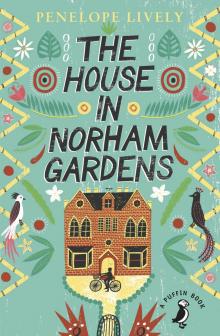 The House in Norham Gardens
The House in Norham Gardens Family Album
Family Album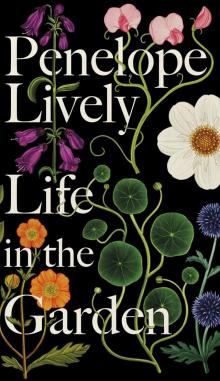 Life in the Garden
Life in the Garden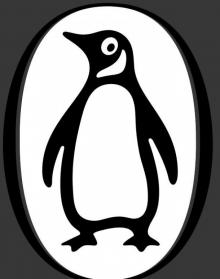 Oleander, Jacaranda: A Childhood Perceived
Oleander, Jacaranda: A Childhood Perceived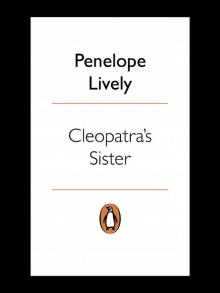 Cleopatra's Sister
Cleopatra's Sister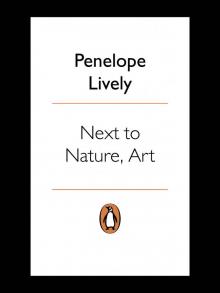 Next to Nature, Art
Next to Nature, Art A Stitch in Time
A Stitch in Time Moon Tiger
Moon Tiger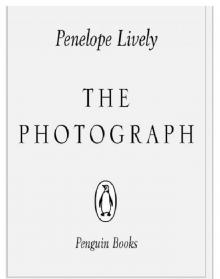 The Photograph
The Photograph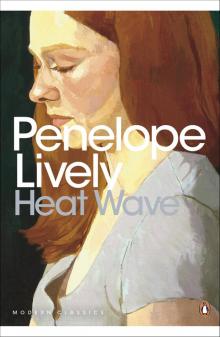 Heat Wave
Heat Wave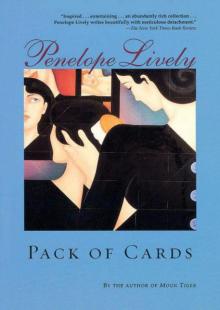 Pack of Cards
Pack of Cards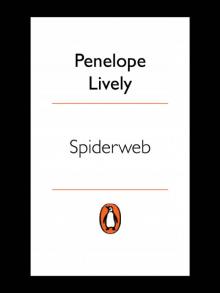 Spiderweb
Spiderweb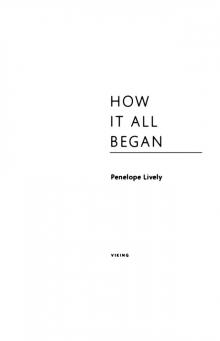 How It All Began
How It All Began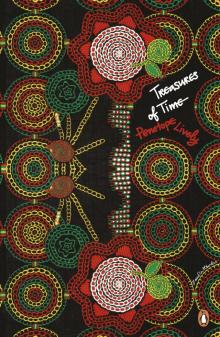 Treasures of Time
Treasures of Time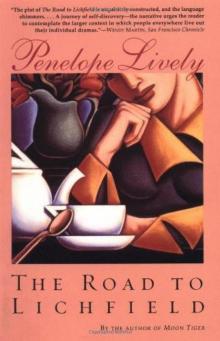 The Road to Lichfield
The Road to Lichfield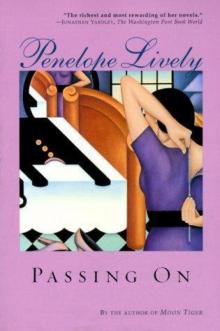 Passing On
Passing On Making It Up
Making It Up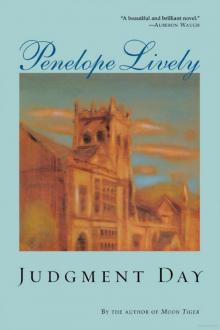 Judgment Day
Judgment Day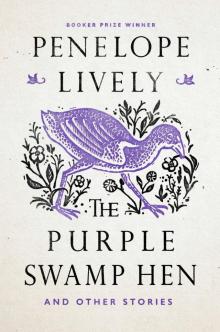 The Purple Swamp Hen and Other Stories
The Purple Swamp Hen and Other Stories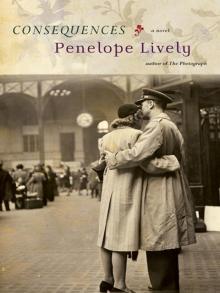 Consequences
Consequences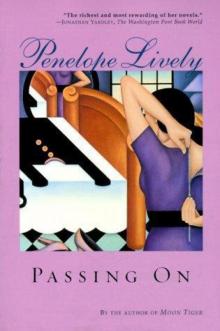 *****Passing On*****
*****Passing On*****